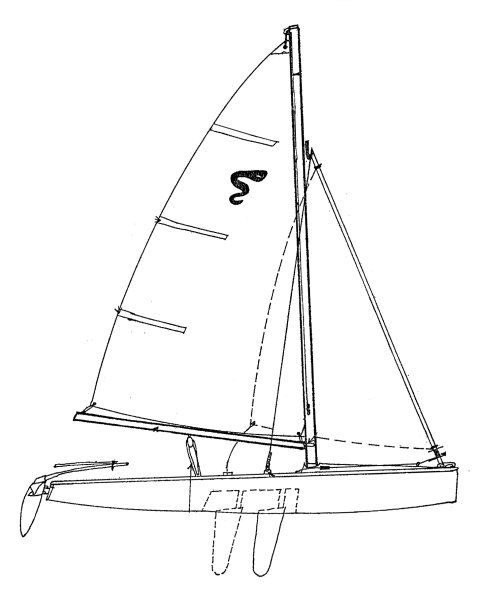The Sidewinder 16 is a compact and versatile monohull sailboat, renowned for its simple design and accessibility, making it a popular choice for recreational sailing and learning. Built by the MFG Boat Company, a pioneer in mass-produced fiberglass boats, the Sidewinder 16 quickly became the company's most successful sailboat model. Designed by the collaborative talents of J.R. (Rod) Macalpine-Downie and Dick Gibbs, this fractional sloop features a clever adjustable centerboard system that enhances its adaptability on the water.
Sidewinder 16 Information, Review, Specs

- Make
- Model
- Number Built
- Production Year(s)
- 1969 - ??
Production of the Sidewinder 16 began in 1969, though the most significant period of its manufacturing, during which over 2,000 units were built, spanned from 1973 to 1979. The MFG Boat Company, originally known as Molded Fiber Glass Corporation, applied its extensive experience in fiberglass construction—famously used for the Chevrolet Corvette body—to boat building, focusing on creating functional, accessible, and affordable pleasure craft.
The design of the Sidewinder 16 is credited to the British maritime architect J.R. (Rod) Macalpine-Downie and Dick Gibbs. Their philosophy for the Sidewinder 16 appears to have emphasized a speedy hull design and remarkable versatility. A distinctive feature of the Sidewinder 16's design is its adjustable centerboard pivot point, which can be moved fore and aft, allowing the boat to be configured for either sloop or cat rig sailing. This innovation provided flexibility in trim and performance, catering to different sailing preferences or conditions.
Sailing Performance and Handling
The Sidewinder 16, with a length overall of 15.5 feet and a waterline length of 14.33 feet, is characterized as a centerboard dinghy, designed for a hull speed of approximately 5.07 knots. Its lightweight fiberglass hull contributes to its nimble feel.
A key aspect of the Sidewinder 16's handling is its centerboard, which can be raised to a minimum draft of 0.42 feet, making it ideal for shallow waters or beaching, and lowered to a maximum draft of 3.0 feet for improved upwind performance. The ability to adjust the centerboard's pivot point for either a sloop or cat rig offers owners a unique degree of control over the boat's balance and handling characteristics, allowing for fine-tuning based on wind conditions or sailing style. While anecdotal descriptions are sparse, the "speedy hull design" suggests a lively and responsive sailing experience for a boat of its size.
Accommodations and Layout
Given its compact size, the Sidewinder 16 is primarily intended as a day sailor. The boat does not feature extensive interior accommodations. Information regarding specific headroom or cabin layouts is not readily available, suggesting that any enclosed space would be a rudimentary cuddy, primarily for storage or shelter rather than overnight stays. The design prioritizes open cockpit space for active sailing and recreational use.
Measurements
Construction & Hull
- Construction Material
- Fiberglass (Solid)
- Hull Type
- Monohull Sailboat
- Keel Type
- Centerboard
- Rudder
- 1x —
- Ballast
- -
- Displacement
- 175 lbs
- Water Capacity
- -
- Fuel Capacity
- -
Engine
- Engine Make
- —
- Engine Model
- —
- Engine Type
- —
- Engine HP
- —
- Engine Count
- 1
- Drive Type
- —
- Fuel Type
- —
Rig & Sails
- Rig Type
- Fractional Sloop
- P (Main Luff)
- -
- E (Main Foot)
- -
- I (Foretriangle Height)
- -
- J (Foretriangle Base)
- -
- Forestay Length (est)
- -
- Main Sail Area
- -
- Foretriangle Sail Area
- -
- Total Sail Area (Reported)
- 107.5 sqft
- Total Sail Area (Calc)
- -
Dimensions
- LOA
- 15.5 ft
- LWL
- 14.33 ft
- Beam
- 4.5 ft
- Draft
- 3 ft
- Max Headroom
- -
- Air Draft
- -
Calculations
- Hull Speed
- 5.07 kn
- Pounds per Inch Immersion
- 230.41